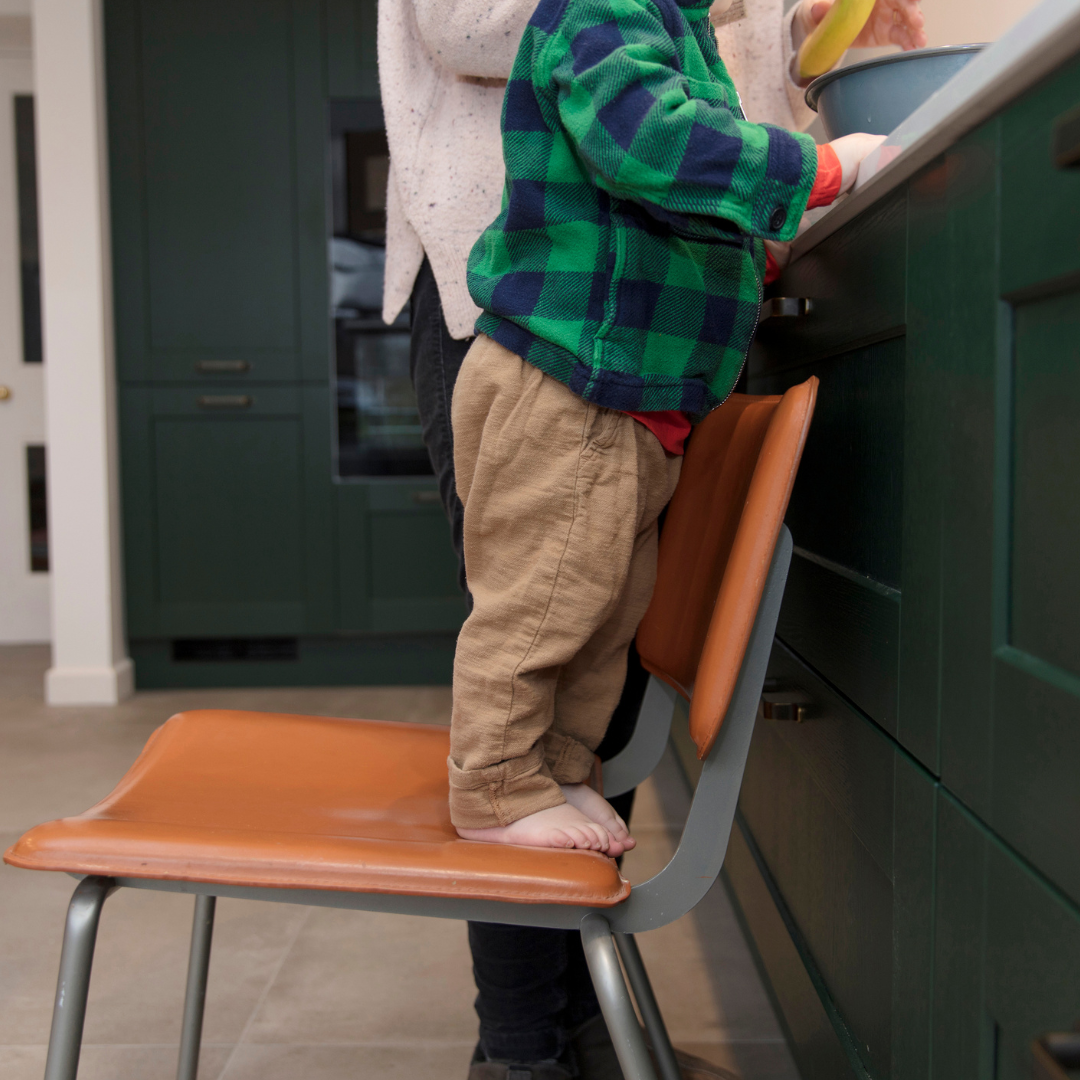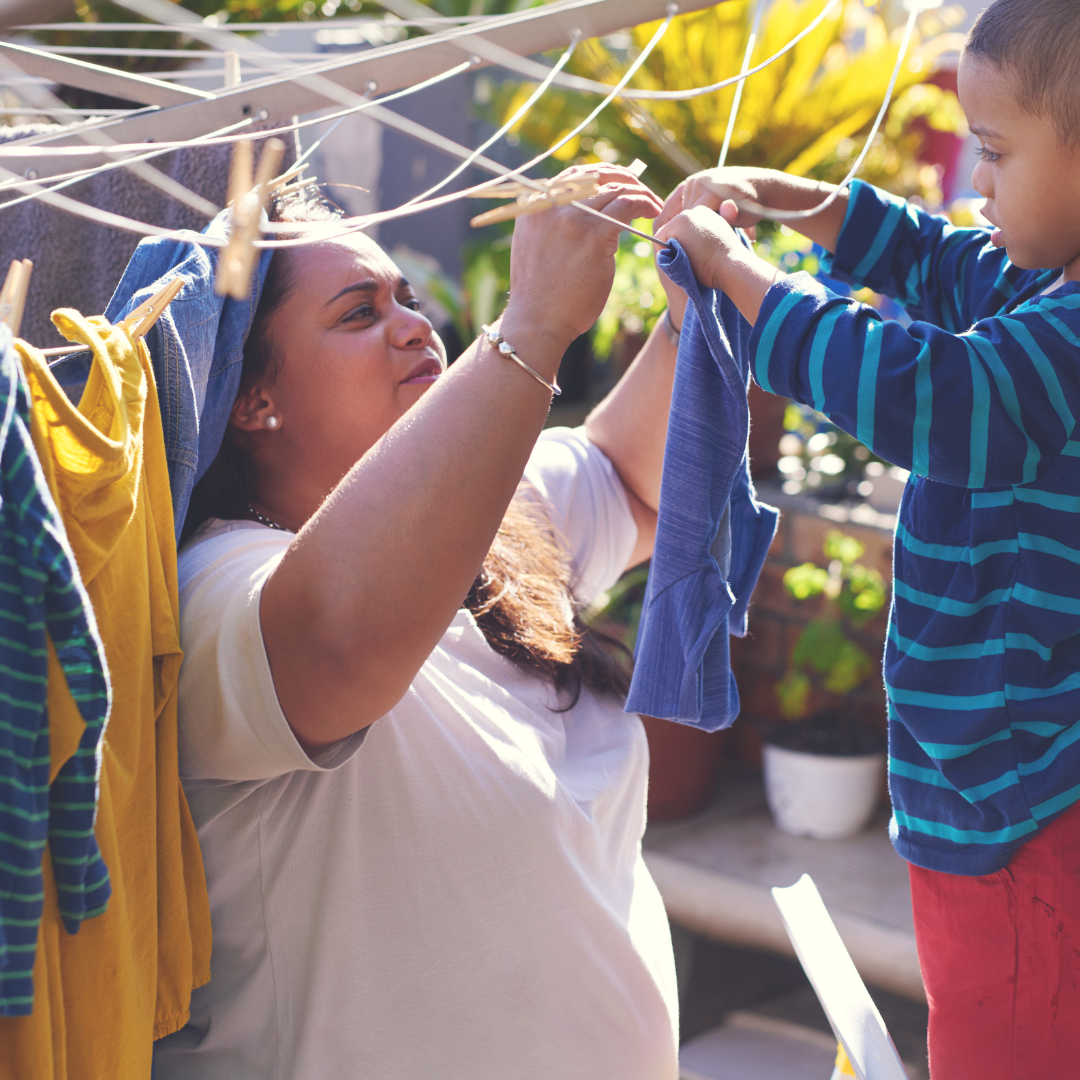Research shows kids who do chores are more successful….. but how do you ACTUALLY get your child to do them?

Last week I went away for a girl’s weekend. Much to my surprise and delight I came home to a SPOTLESS home. The washing was done, the lawns were mowed, even my car was washed! I looked at my hubby in disbelief and he said with a smile: “I found a new trick… I wrote each boy a list of 2/3 chores on a post it note and handed it to them. I told them chores before anything else and they just …..did it!”
He was pleased with his ‘dad hack’ - and I couldn’t believe it. Because it’s not always simple to get four different personalities doing chores as asked in our home.
At the same time: we both also know from our experience of raising four boys why this technique did in fact work so much better than the usual ask, then nag and then yell approach that let’s be honest, we all occasionally slip into.
I’ve seen a lot of buzz this week on social media about new research that indicates that children who regularly help around the home with chores may perform better academically, have better executive function, self-esteem and stronger problem-solving skills.
This research isn’t exactly new, a Harvard Grant Study, which has been running since 1938 to present (the longest running longitudinal study in history) has identified two key things that enable adults to be happy and successful:
First, love.
Second, work ethic.
We all want our kids to be successful, so how do we develop “work ethic” in our kids? It turns out that getting them to do chores is the one of the most significant predictors.

Research published recently in Australian Occupational Therapy Journal backs this research up and has found that that children who were required to do chores were more likely to exhibit better academic performances and problem-solving skills
As a parent educator I read all of this and nod enthusiastically. Yep, makes total sense……As a mum of four trying to get my kids to just pick up their bloody shoes? I want to tear my hair out in frustration.
The thing about parenting is, we can KNOW all this great information:
That eating green veggies is healthy
That having a reasonable bedtime is important
That participating in team sports helps cooperative skills, and
That doing chores is good for kids executive function….
BUT Getting kids to actually DO these things is another story right?
When it comes to kids and chores: We can lead a horse to water….. but it might look us in the eyes and say “my legs hurt” “I hate that” or “NO!!” …… and then what do we do? Do we push them? Bribe them? Threaten them? Or give up and do it ourselves?
Some days rather than growing Australia’s future leaders we feel more like we are waging a war in the trenches with angry mini humans and as long as they eat some cheerio’s from the car floor, and we survive the battle of teeth brushing or bathing – we consider that survival.
For older kids the pressure of the after-school chaos / dinner homework battles is so much that we can’t even fathom getting them to clear their own plate. Because it feels like another thing to manage.
We are also busy and so stopping to show kids HOW to do things takes time. We know we should do it but between the school and preschool run, extracurricular work and life there just isn’t the time.
So we get the kids to bed - then WE pick up the toys, wipe the food off the floor, and we do the chores ourselves because it easier than another battle and we need it done.
However, getting kids to do chores has big benefits. Executive function and future success aside, I believe that all humans feel good when they are needed, wanted, and part of a team.
Believe it or not - chores can also be a great way to spend time as a family, the key is lightening up and keeping the hierarchy of what matters most in your mind. Because what we forget when we focus on only once piece of advice (chores are good for kids) but forget that what matters above all else is love and connection. We are off track.

So how can we incorporate chores without losing our minds? And how do we do it in a way that keeps our relationship with our child as central?
Here are my top five tips for getting kids onboard with family chores:
Connect with them first
Kids are not trying to be difficult.
Our kids desperately want to be the kid that goes well, pleases you and does the chores.
There are just a few things in the way of that happening and put simply it’s development.
Your child has a brain that can’t multitask the way an adult brain does, and they struggle to stop playing to do a chore, it’s also normal for kids to resist and butt up against us. What feels stubborn and difficult is most often healthy development.
Frustrating. OMG YES. Healthy. Also, yes.
When we connect FIRST, we cut through a lot of that resistance.
Our child is so much more likely to hear us when we first hear them. Using touch, song, play, fun and lightness to first fill your child’s emotional cup is a brilliant want to start. Then we need to tell them what we need in simple broken-down tasks.
Say: “This is fun game! I love how everyone’s involved and I know you don’t want to stop… next up it’s dinner. And I need your help to get ready…. Who wants to put the knives and forks on the table and who wants to help me get the plates out?”
Yeah, it takes a second. But it works SO well, and kids love feeling seen by us, and needed as part of a team.
Commentate on what you see
Children just don’t ‘see’ what we see.
They don’t see the shoes on the bathroom floor, the snack wrapper they have dropped, the craft mess... and the LEGO...... all that LEGO!!!! They see play, and imagination and when we come in exasperated because they don’t see it the way we do, (and don’t get me wrong I do too) we get nowhere.
Instead try this idea of commentating on what you see:
“I see paper on the ground, I see textas with caps off. We can’t get out the next toys out until we get this cleaned up: Iris, how about you do the textas and your brother and I will do the papers?”
This narrating helps kids develop the ability to begin to SEE the mess. This is a big part of fostering their ability to intuitively help without prompting in the future.
Help them (and be kind)
I have four kids. My eldest is at an age where he is pretty good about folding washing and helping out. He also mows our lawn once a week for money on his ‘spriggy’ but it’s not all skipping around being helpful as first nature in my house.
Personality, temperament, and development play a role in how capable kids are of being where we’d like them to be with chores. If kids are not able to get the job done the way we’ve asked we need to look at why, and how we can provide more support, so they get that feeling of success.
We need to meet kids where they are at and provide enough support with the job to get them going. It might be breaking down a task of cleaning up a room, so they pick up one thing and you do the rest. It might feel like they are doing so little ‘for their age’ but when we keep our mind on any progress if progress and lower the pressure, we get less resistance.
So until they can do it, we help out, and we model being kind as we do it. They really do learn from what we do more than what we say. This leads to better cooperation long term.
Create visual cues and clues
I say it a lot, but I am not kidding. Draw or write it out.
Kids process things so much better visually. You want them to pull up their bed and brush their teeth each day, make a visual reminder for their wall they can tick off. (They won’t need a reward to do this because they want to go well.)
Thinking of it like this, when you have something that needs planning like having friends for dinner – do you write a list so you can keep track of the tasks? We all go better with a cue to keep us tracking.
Tips for younger kids – use a whiteboard and draw out 2/3 very basic tasks followed by a reward or game. Try to use images rather than words and talk them though the plan. It might surprise you how much they engage when they have a visual list.
Try to have fun.
None of us go well when we are in trouble before we begin. Bringing lightness and fun into chores increases cooperation but also has your child intrinsically wanting to go well.
It might be saying “today we are going to war against the WEEDS in the garden! It’s a big project and I need really your help”. Teach your kids which ones are weeds or have a competition on who can pick up the most toys / rubbish / leaves from the yard and give them a container each and make it a race. The goal is to create a feeling of teamwork here over how much we actually get done.
You might notice I haven’t mentioned a reward chart, pocket money or payment here.
This is because I’ve never noticed much success in these strategies with my boys. The currency runs out, we all forget about the chart, or they are just not motivated by it long term. I’ve noticed that when we focus on teamwork or connection kids intrinsically want to help, and this is half the battle.
The evidence backs this up. Rewards and payments don’t increase intrinsic motivation long term in younger kids, but it can motivate them short term as I always say if it’s working for you to get things moving in your home this is totally A OK.
Development is a long game. Some days our kids (just like us) don’t have it in them to be where we’d like them to be with cooperation. It's important to keep reminding ourselves that 'Rome wasn't built in a day' and 'Human development feels like it takes even longer'.
Our job is to continue to model, and trust that this skill is in them. Notice the days they do help and remember to thank them for being a part of the team.
p.s
Next week I am going to give you my top 5 chores that I PROMISE YOU your kids are going to love, and you will too. (Hint hint.. one of them involves getting them to clean your skirting boards and you will never look back!!)

